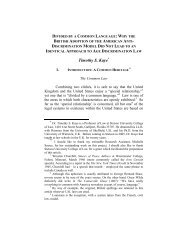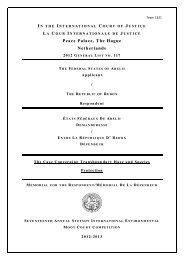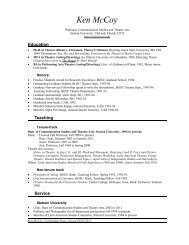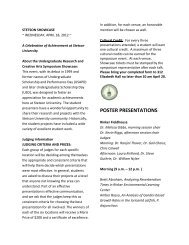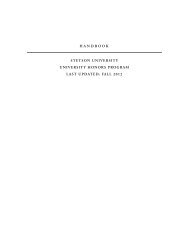Tiffany Huet Class of 2008 Justifying Violence: A ... - Stetson University
Tiffany Huet Class of 2008 Justifying Violence: A ... - Stetson University
Tiffany Huet Class of 2008 Justifying Violence: A ... - Stetson University
You also want an ePaper? Increase the reach of your titles
YUMPU automatically turns print PDFs into web optimized ePapers that Google loves.
Introduction<br />
This paper is about the ethical justification <strong>of</strong> killing from religious convictions. Initially,<br />
my interest in the question <strong>of</strong> the ethical questions about violence was embedded in the writings<br />
and actions <strong>of</strong> Dietrich Bonhoeffer, a German theologian during World War II, who attempted to<br />
assassinate Hitler and was ultimately killed for it. It was interesting to read his initial, pacifistic<br />
beliefs about what the Christian should look like today and then see him seemingly contradict<br />
himself later with this deliberate proposal and plan <strong>of</strong> premeditated violence. How is it that a<br />
man who claims a Christian should live for others (as opposed to living for oneself) is able to<br />
justify an elaborate conspiracy to kill someone? Of course, I realize that this person we are<br />
discussing is Hitler, who is frequently used as the epitome <strong>of</strong> evil in human form; however, the<br />
basis <strong>of</strong> the question I was raising in these initial phases <strong>of</strong> my study was not concerning the<br />
concentration <strong>of</strong> evil found in Hitler’s undoubtedly disturbed psyche. The question was<br />
concerning Bonhoeffer’s adherence to his own code <strong>of</strong> ethics, which he adjusted as he<br />
experienced and witnessed the evil <strong>of</strong> Nazism and became involved in active resistance. Why the<br />
adjustment? How does he drastically alter his ethic to fit in the action <strong>of</strong> tyrannicide? These<br />
questions (and more) were answered, I found, in a rather remarkable and innovative work by<br />
Larry Rasmussen.<br />
Hence, the shape <strong>of</strong> this present study has become comparative. I wanted to understand<br />
which justifications, if any, for an act <strong>of</strong> violence could actually justify the violent act. As a<br />
result, I decided to compare two examples <strong>of</strong> Christian violence and one <strong>of</strong> Muslim “terrorism”<br />
with the underlying question, “Does any difference exist between the two?” The purpose <strong>of</strong> this<br />
paper is, therefore, to analyze and contrast the logic whereby each <strong>of</strong> the proponents <strong>of</strong> killing<br />
3



